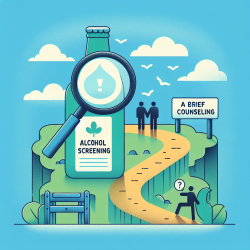Understanding the Importance of Alcohol Screening and Brief Intervention
As healthcare practitioners, we are always striving to improve patient outcomes by integrating evidence-based practices into our routines. One such practice is Alcohol Screening and Brief Intervention (ASBI), which has been recommended by the U.S. Preventive Services Task Force (USPSTF) since 2004. The recent study titled "Screening for Excessive Alcohol Use and Brief Counseling of Adults — 17 States and the District of Columbia, 2014" provides valuable insights into the current state of ASBI implementation and its potential benefits.
The Data Speaks: Current ASBI Implementation
The study analyzed data from the 2014 Behavioral Risk Factor Surveillance System (BRFSS) across 17 states and the District of Columbia. It revealed that while 77.7% of adults reported being asked about alcohol use during a checkup, only 32.9% were asked about binge-level consumption. Among binge drinkers, only 37.2% were advised about the harms of excessive drinking, and a mere 18.1% were advised to reduce or quit drinking.
This data highlights a significant gap in the implementation of ASBI, suggesting that healthcare providers are not fully utilizing this tool to its potential. Proper implementation of ASBI could lead to a reduction in excessive alcohol use and its associated harms, such as chronic diseases and injuries.
Why ASBI Matters
Excessive alcohol use is a major preventable cause of morbidity and mortality, contributing to over 88,000 deaths annually in the U.S. It is associated with various health issues, including heart disease, cancer, and injuries. ASBI has been shown to reduce episodes of binge drinking, decrease weekly alcohol consumption, and increase compliance with recommended drinking limits.
By integrating ASBI into routine healthcare practices, we can identify individuals at risk and provide them with the necessary counseling to mitigate these risks. This not only improves individual health outcomes but also has the potential to reduce healthcare costs associated with alcohol-related issues.
Steps for Practitioners to Enhance ASBI Implementation
- Education and Training: Ensure that all healthcare staff are trained in ASBI techniques and understand the importance of these interventions.
- Utilize Technology: Incorporate ASBI prompts and screening tools into electronic health records to facilitate routine implementation.
- Collaborate with Community Resources: Establish connections with local support groups and treatment facilities to provide comprehensive care for patients who need it.
- Measure and Improve: Regularly assess the effectiveness of ASBI in your practice and seek ways to improve its implementation.
Encouraging Further Research and Implementation
While the study provides a snapshot of ASBI implementation, further research is needed to explore the barriers healthcare providers face in implementing these interventions. Understanding these challenges can help develop targeted strategies to improve ASBI uptake.
For practitioners looking to enhance their skills and contribute to better health outcomes, delving deeper into the research and actively seeking ways to implement ASBI can be a transformative step.
To read the original research paper, please follow this link: Screening for Excessive Alcohol Use and Brief Counseling of Adults — 17 States and the District of Columbia, 2014.










